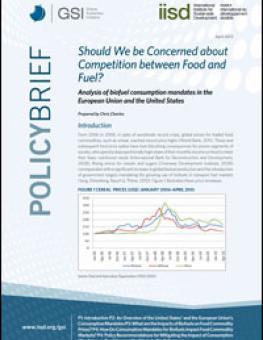
Should We be Concerned about Competition between Food and Fuel? Analysis of biofuel consumption mandates in the European Union and the United States
In academic literature and research modelling food-market prices, expanding biofuel production is consistently attributed some role in the rising cost of food commodities.
The European Union and United States biofuel markets' account for 62 per cent of 2010 global biofuel consumption and sizeable biofuel consumption targets have been implemented in both economies. This policy brief discusses the impact of European Union and United States consumption targets on food commodity prices and provides a number of recommendations to help reduce competition between already constrained agricultural markets and increasing biofuel production.
A number of findings are provided:
- The speed at which biofuel production has increased over the last decade may have exacerbated food price volatility and contributed to rising food commodity prices.
- The rigidity of biofuel consumption targets and the relative inelasticity of agricultural production will result in ongoing conflict between energy and agricultural markets.
- The range of research and modelling results looking at the role of biofuels in previous food price spikes and modelling their potential future impact on food commodity prices indicate there is some uncertainty in the literature on the exact extent of the role of biofuels.
Several potential options are being discussed by policy-makers. This policy brief discusses two main policy recommendations:
- Reducing the rigidity of biofuel consumption targets imposed by mandates to help ease competition between energy and agricultural markets
- Ensure strong reporting requirements for the European Union's and United States' biofuel policies, including provisions on the use of food crops as feedstocks in order to ensure the issue of increasing food commodity prices are within a formal policy reporting structure.
You might also be interested in
COP 29 Outcome Moves Needle on Finance
In the last hours of negotiations, concerted pressure from the most vulnerable developing countries resulted in an improved outcome on the finance target, with a decision to set a goal of at least USD 300 billion per year by 2035 for developing countries to advance their climate action.
The United Kingdom, New Zealand, and Colombia Join Coalition to Phase Out Fossil Fuel Subsidies
Today on the sidelines of the UN Climate Conference in Baku (COP 29), the United Kingdom, New Zealand, and Colombia joined the international Coalition on Phasing Out Fossil Fuel Incentives Including Subsidies (COFFIS).
COP 29 Must Deliver on Last Year’s Historic Energy Transition Pact
At COP 29 in Baku, countries must build on what was achieved at COP 28 and clarify what tripling renewables and transitioning away from fossil fuels means in practice.
How Indonesia's Incoming President Can Advance the Transition to Clean Energy
With Prabowo Subianto inaugurated as Indonesia’s President, speculation abounds about the new administration’s commitment to the clean energy transition and climate targets, given Prabowo’s positioning as the “continuity candidate.” The question is, what, exactly, will be continued?